Data Coordinators are fundamental in managing and overseeing data in various forms. They ensure that data is accurate, accessible, and secure, which is crucial for any organization relying on data-driven decision-making.
The role requires a mix of technical skills such as database management and data analysis, along with soft skills like attention to detail and effective communication.
Candidates can write these abilities in their resumes, but you can’t verify them without on-the-job Data Coordinator skill tests.
In this post, we will explore 8 essential Data Coordinator skills, 9 secondary skills and how to assess them so you can make informed hiring decisions.
Table of contents
8 fundamental Data Coordinator skills and traits
The best skills for Data Coordinators include Data Management, Database Proficiency, Data Analysis, Reporting Skills, Attention to Detail, Project Management, Technical Writing and Data Privacy.
Let’s dive into the details by examining the 8 essential skills of a Data Coordinator.
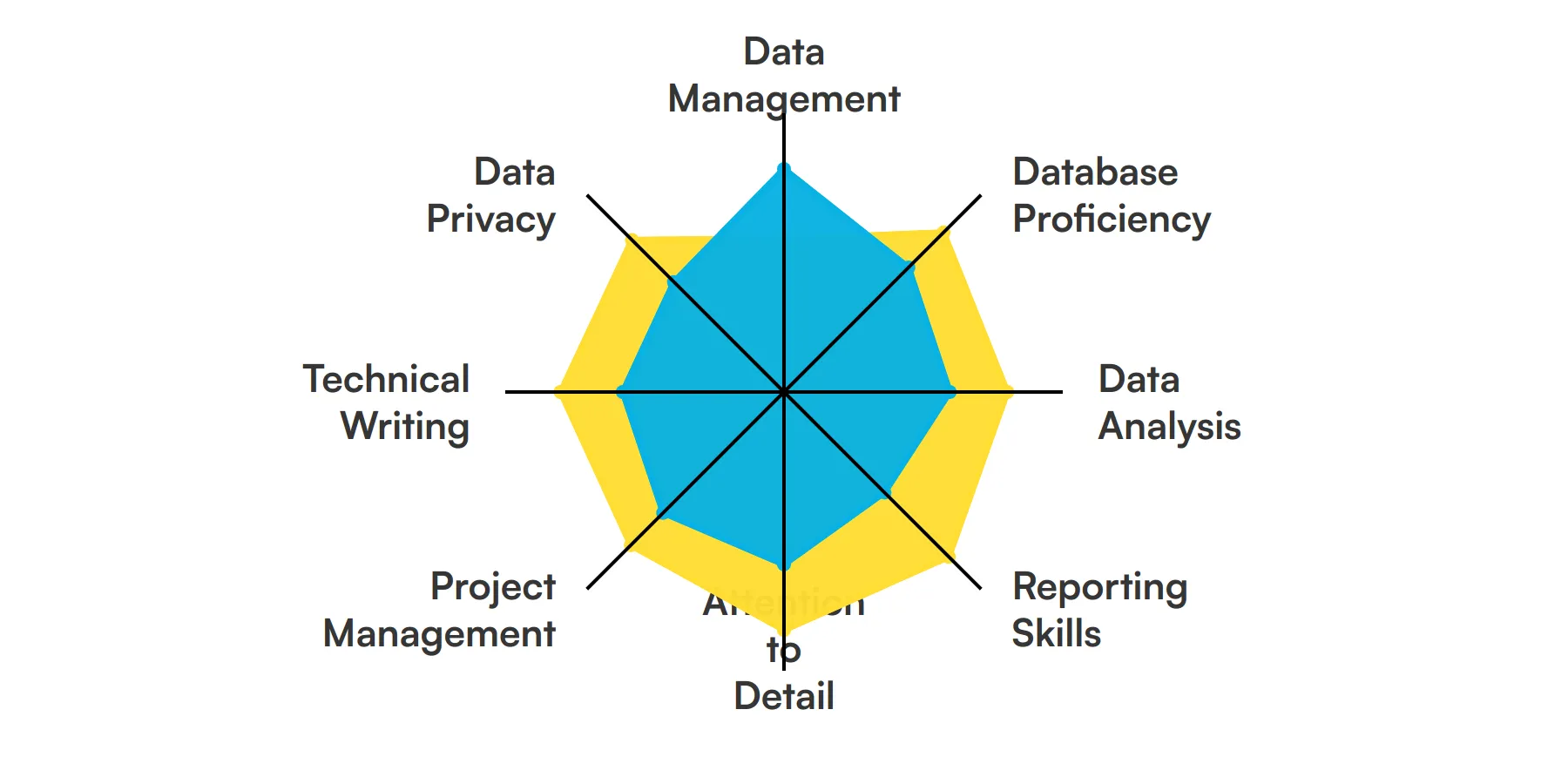
Data Management
Data Coordinators must excel in organizing, storing, and retrieving data. They ensure that data systems are efficient and that the data is accessible yet secure. This skill is crucial for maintaining the integrity and reliability of data which supports informed decision-making processes.
For more insights, check out our guide to writing a Data Manager Job Description.
Database Proficiency
Proficiency in database software such as SQL or Oracle is necessary for a Data Coordinator. This skill involves creating, managing, and manipulating databases to handle large sets of data effectively, which is central to the role.
Data Analysis
Analyzing data to extract meaningful insights is a key responsibility for Data Coordinators. They use statistical tools and techniques to interpret data, helping organizations to make strategic decisions based on factual data.
Check out our guide for a comprehensive list of interview questions.
Reporting Skills
Data Coordinators must be adept at creating detailed reports that clearly communicate findings from data analysis. These reports help stakeholders understand trends, patterns, and predictions, and are essential for strategic planning.
Attention to Detail
This skill is critical as Data Coordinators need to ensure accuracy and precision in data entry and analysis. Minor errors can lead to major discrepancies in data interpretation, affecting business decisions and operations.
Project Management
Data Coordinators often oversee projects that involve multiple data streams and deadlines. Skills in project management ensure that they can plan, execute, and finalize projects according to strict deadlines and within budget.
For more insights, check out our guide to writing a Project Manager Job Description.
Technical Writing
The ability to document processes and results clearly and comprehensively is important. Data Coordinators use this skill to write manuals, procedural documentation, and reports that are understandable for all stakeholders.
Data Privacy
Understanding and implementing data protection regulations is essential. Data Coordinators ensure that all data handling practices comply with legal standards to protect the organization from data breaches and penalties.
Check out our guide for a comprehensive list of interview questions.
9 secondary Data Coordinator skills and traits
The best skills for Data Coordinators include Collaboration, Problem Solving, Adaptability, Communication, Time Management, Critical Thinking, Technical Proficiency, Customer Service and Multitasking.
Let’s dive into the details by examining the 9 secondary skills of a Data Coordinator.
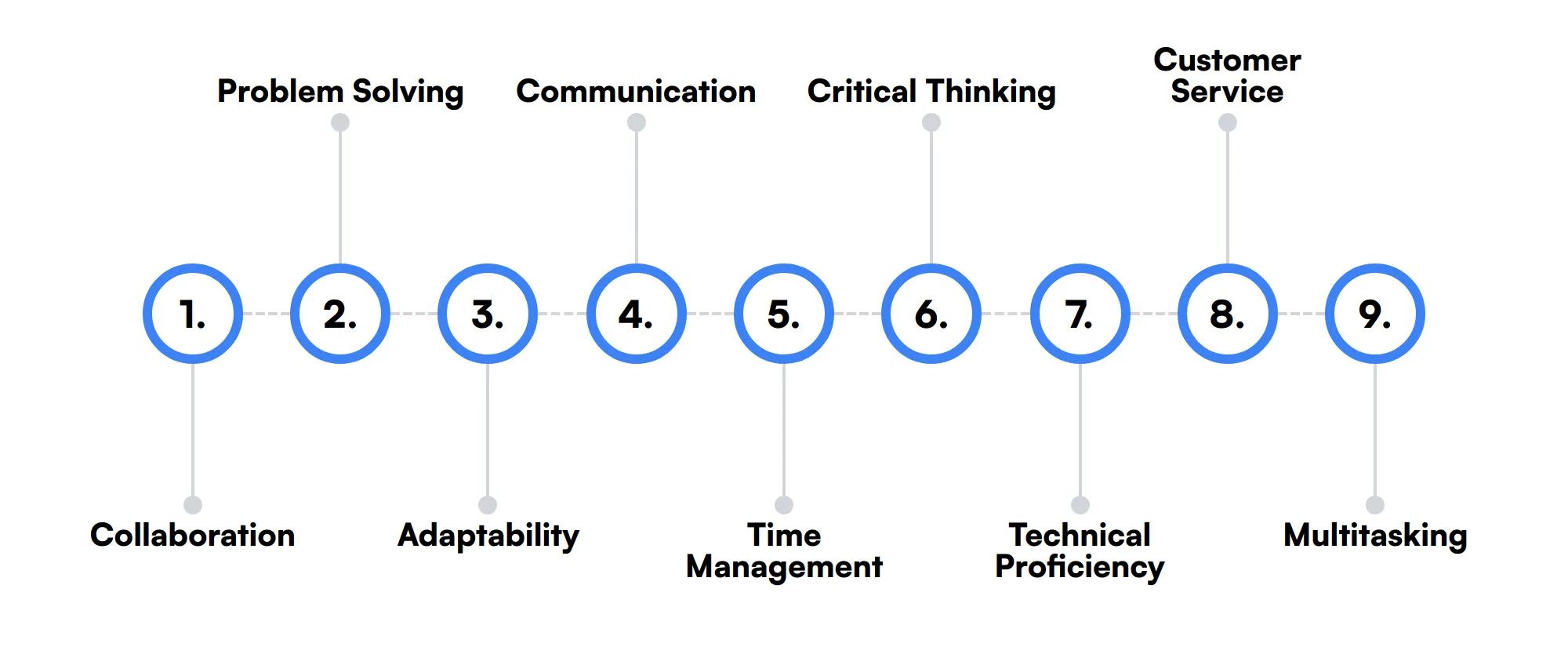
Collaboration
Working with various departments to gather and interpret data means Data Coordinators must be effective collaborators. This skill ensures that data-driven projects benefit from cross-departmental insights and expertise.
Problem Solving
Data Coordinators often encounter complex issues requiring innovative solutions. Problem-solving skills enable them to efficiently resolve issues and ensure the stability of data management systems.
Adaptability
The ability to adapt to new tools and evolving technologies in data management and analysis is important for staying effective in the role as technologies and methodologies advance.
Communication
Effective communication is key for Data Coordinators to convey data insights and complex information in a way that is accessible to all stakeholders, including those without a technical background.
Time Management
Managing multiple data streams and projects efficiently requires excellent time management skills. This helps Data Coordinators meet deadlines and manage their workload effectively.
Critical Thinking
The ability to think critically helps Data Coordinators evaluate data, identify trends, and make informed decisions that align with organizational goals.
Technical Proficiency
Keeping up-to-date with the latest software and tools in data management and analysis is beneficial for enhancing the efficiency and capabilities of Data Coordinators.
Customer Service
Understanding the needs and expectations of internal or external clients can help Data Coordinators tailor data reports and communications to meet user requirements effectively.
Multitasking
The ability to handle multiple tasks simultaneously is valuable in a fast-paced environment where Data Coordinators may be required to juggle various data-related tasks.
How to assess Data Coordinator skills and traits
Assessing the skills and traits of a Data Coordinator can be a nuanced process. It's not just about verifying their technical abilities but also understanding their attention to detail, project management skills, and how they handle data privacy. While resumes can provide a snapshot of their qualifications, they often fall short in revealing the candidate's true proficiency and fit for your specific needs.
To get a comprehensive understanding of a candidate's capabilities, skills-based hiring practices, such as talent assessments, are invaluable. These assessments can help you evaluate their data management, database proficiency, data analysis, and reporting skills effectively. Adaface on-the-job skill tests are designed to help you achieve 2x improved quality of hires and an 85% reduction in screening time, ensuring you find the right fit for your team.
Let’s look at how to assess Data Coordinator skills with these 6 talent assessments.
CISCO Data Center Online Test
The CISCO Data Center Online Test evaluates a candidate's knowledge and skills related to various aspects of data center operations. It covers topics such as data center networking, Cisco UCS, storage area networks, data center security, virtualization, and network architecture.
The test assesses their understanding of data center networking, Cisco UCS, storage area networks, and data center security. Candidates are also evaluated on their knowledge of virtualization, network architecture, and data center management.
Successful candidates demonstrate proficiency in data center automation and troubleshooting. They also show a strong grasp of network services and data center management.
SQL Online Test
The SQL Online Test evaluates a candidate's ability to design and build relational databases and tables from scratch, apply CRUD options, write efficient queries and subqueries to filter data, and create efficient indexes for faster SQL queries.
This test assesses their skills in creating databases, CRUD operations on tables, joins and subqueries, and conditional expressions and procedures. Candidates are also tested on their knowledge of views, indexes, string functions, and mathematical functions & timestamps.
High-scoring candidates show proficiency in locks and transactions, scale and security, and demonstrate the ability to write optimized SQL queries.

Data Analysis Test
The Data Analysis Test assesses a candidate's ability to handle, modify, analyze, and interpret data. The test uses scenario-based MCQ questions to screen for experience with analyzing data to find possible outcomes, detect anomalies, extract meaningful insights, project estimates, and visualize data using charts and graphs.
The test evaluates their understanding of data modeling, data analysis, business analysis fundamentals, and data interpretation. Candidates are also assessed on their skills in data queries and databases (SQL), data operations, and data investigations.
Successful candidates demonstrate proficiency in using popular data tools like Excel and show a strong ability to interpret and visualize data effectively.

Excel & Data Interpretation Test
The Excel & Data Interpretation Test uses scenario-based MCQs to evaluate candidates' ability to perform tasks such as data manipulation, statistical analysis, financial modeling, problem-solving, and critical thinking.
The test assesses their skills in basic Excel formulas, Excel math formulas, analyzing data in Excel using pivots and filters, and visualizing data in Excel. Candidates are also tested on their ability to interpret graphs, analyze tables, and draw inferences.
High-scoring candidates show proficiency in data visualization and demonstrate the ability to communicate their findings effectively through visualizations and reports.
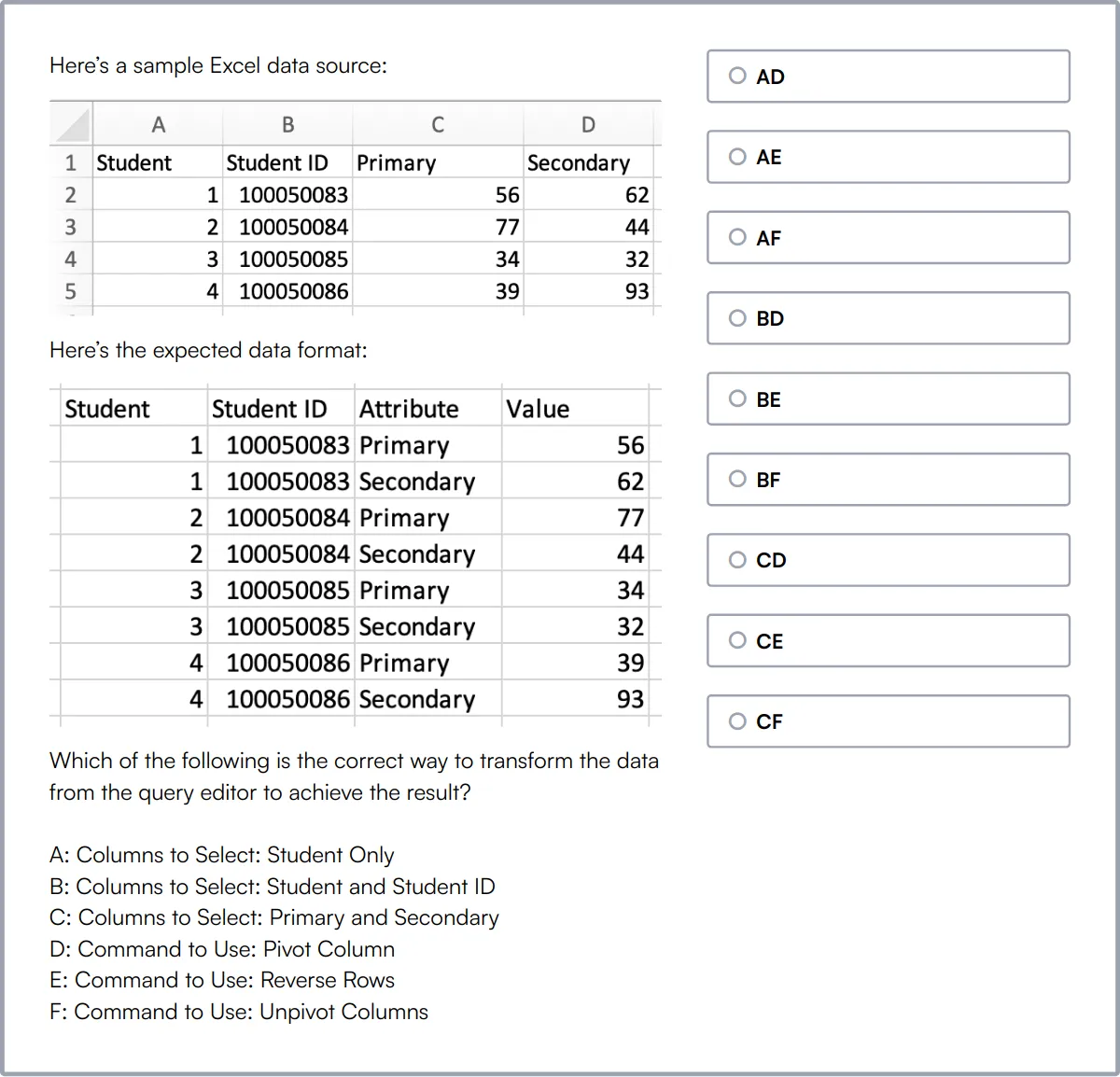
Attention To Detail Test
The Attention to Detail Test evaluates a candidate's ability to focus on the task and their willingness to be thorough for detail-oriented work. You can use this test to find candidates who pay attention to detail while processing information and ensure high-quality work.
The test assesses their skills in following instructions, verifying data, checking consistency, and proof-reading. Candidates are also evaluated on their ability to identify mistakes and detect typos.
Successful candidates demonstrate a keen eye for detail and the ability to maintain high accuracy in their work.
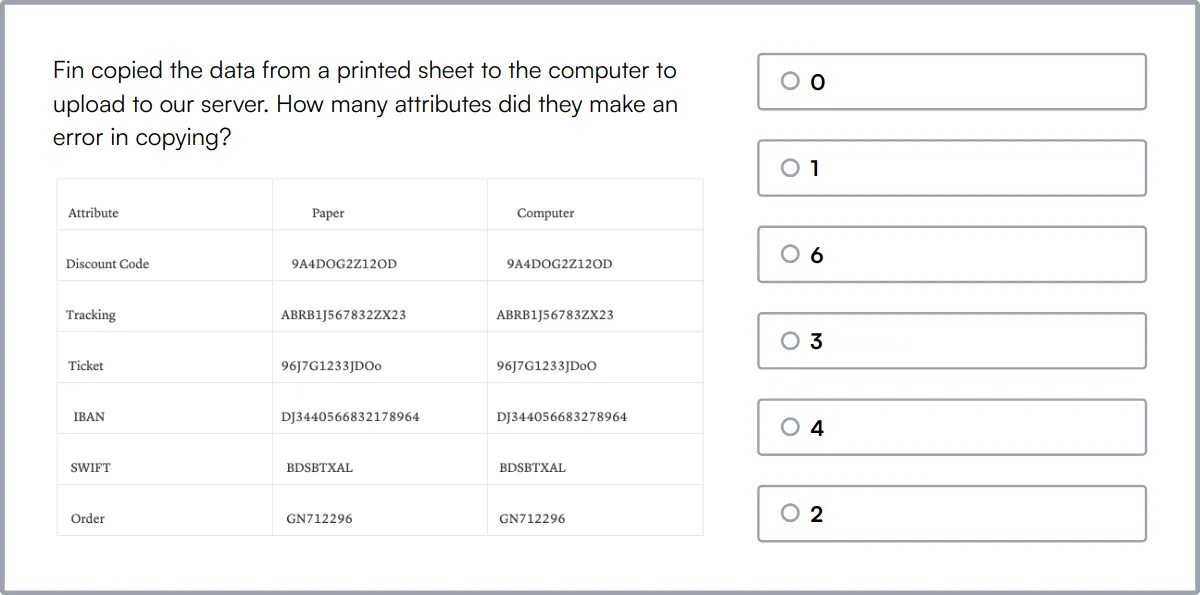
Project Management Test
The Project Management Test assesses a candidate's ability to plan projects from conception to implementation, map timelines, assess risks, allocate budgets, execute the project life-cycle in a phase-wise manner, manage stakeholders, debug issues, and deliver a product or service.
The test evaluates their understanding of cost and budget estimation, situational judgement, key project roles and stages, and designing a project plan. Candidates are also tested on their skills in resolving issues and handling changes, managing and controlling resources, and stakeholder management.
High-scoring candidates show proficiency in prioritizing tasks in real-time, agile project management and Scrum, traditional (waterfall) project management, risk analysis, and creating and analyzing project reports.
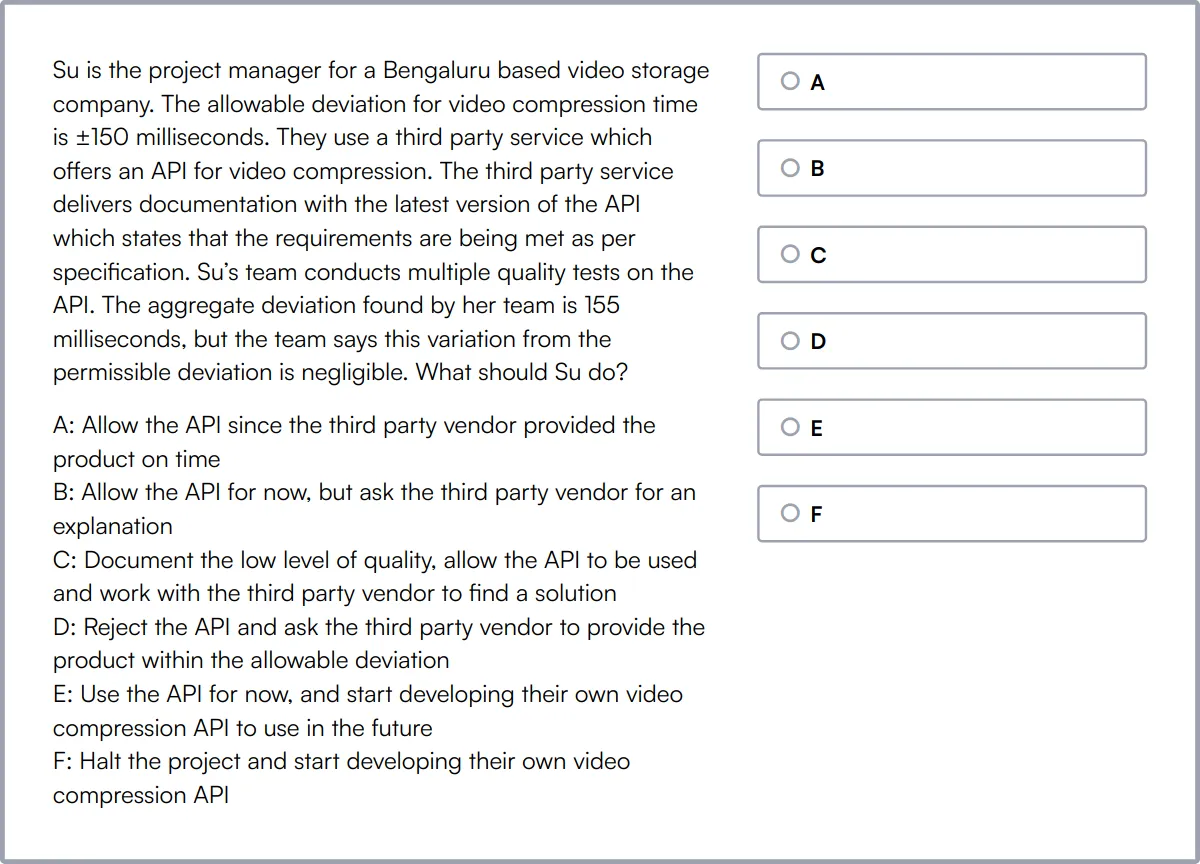
Summary: The 8 key Data Coordinator skills and how to test for them
| Data Coordinator skill | How to assess them |
|---|---|
| 1. Data Management | Evaluate candidate's ability to organize and maintain data systems effectively. |
| 2. Database Proficiency | Assess familiarity and skill with various database technologies and tools. |
| 3. Data Analysis | Test analytical skills through problem-solving with real data sets. |
| 4. Reporting Skills | Review samples of reports to assess clarity and comprehensiveness. |
| 5. Attention to Detail | Check accuracy and thoroughness in completing detailed tasks. |
| 6. Project Management | Observe ability to plan, execute, and finalize projects within deadlines. |
| 7. Technical Writing | Evaluate clarity, coherence, and technical accuracy of written samples. |
| 8. Data Privacy | Assess understanding and implementation of data protection regulations. |
Pre-employment English Online Test
Data Coordinator skills FAQs
What skills are most important for a Data Coordinator?
Key skills for a Data Coordinator include Data Management, Database Proficiency, Data Analysis, and Reporting Skills. Additionally, soft skills like Communication, Collaboration, and Time Management are important.
How can recruiters assess technical writing skills in Data Coordinators?
Recruiters can assess technical writing skills by requesting work samples, conducting written tests that involve creating reports or summaries, or evaluating previous technical documentation the candidate has produced.
What are effective ways to evaluate a candidate's data privacy knowledge?
To evaluate data privacy knowledge, recruiters can ask specific questions about data protection laws, conduct scenario-based assessments, or review certifications such as CIPP or CIPT.
Why is project management important for a Data Coordinator?
Project management skills help Data Coordinators oversee data-related projects, ensure timely delivery, and manage resources effectively. These skills are critical in maintaining the flow and integrity of data management tasks.
How can multitasking be assessed during the hiring process for a Data Coordinator?
Multitasking can be assessed by observing how candidates handle multiple tasks during a simulation exercise or discussing past experiences where they successfully managed several projects or tasks simultaneously.
What role does critical thinking play in the Data Coordinator position?
Critical thinking enables Data Coordinators to analyze data, solve problems, and make informed decisions, which is essential for effective data management and analysis.
How important is adaptability in the Data Coordinator role?
Adaptability is key in a Data Coordinator role as it allows individuals to handle changing technologies, varying data sets, and evolving project requirements smoothly.
Can you suggest some interview questions to assess problem-solving skills in Data Coordinators?
Interview questions could include: Describe a time when you solved a complex data-related problem. What approach did you take? Or, present a hypothetical data inconsistency issue and ask how they would resolve it.

40 min skill tests.
No trick questions.
Accurate shortlisting.
We make it easy for you to find the best candidates in your pipeline with a 40 min skills test.
Try for freeRelated posts
Free resources



